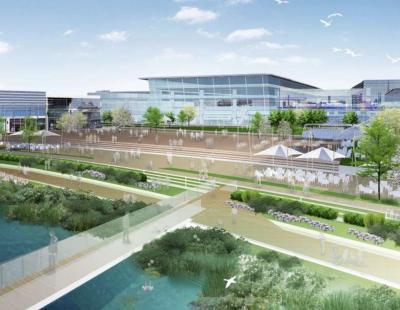Former Rail Minister and Chair of the Transport Select Committee Huw Merriman has been appointed to lead the new Liverpool-Manchester Railway Partnership Board, which aims to support the development and delivery of a new railway between the two cities
The former Conservative MP will bring a wealth of experience as Chair of the Board, which will work alongside the Liverpool-Manchester Railway Board to provide private sector expertise, experience and strategic advice, helping to build the business case for the most ambitious line possible.
Also appointed to the partnership board are Warrington business leader Paul Taylor and Cheshire entrepreneur Trevor Brocklebank, ensuring the region will be well represented in the development of the new vision.
Born and raised in Glazebury, Paul is managing director of the Warrington based companies Taylor Estates (Cheshire) Limited and Cheshire Telecom Limited. He is passionate about the town, working with like-minded companies, charities, organisations and individuals to make Warrington and Cheshire a better place to live and work.
Trevor is co-founder of Warrington headquartered Home Instead Senior Care, now recognised as the UK’s leading home care specialists. He also co-founded Mezenet, an IT Business Intelligence Consultancy, servicing clients such as Unilever, the BBC and Novartis.
Paul and Trevor - along with Warrington Borough Council Leader, Cllr Hans Mundry, who is a member of the main board - will play an important role in ensuring the region remains central to the discussions.
Warrington looks set to play a key role in the plans, with a new a low-level station at Warrington Bank Quay the primary option for the next stage of development for the route between Liverpool and Manchester.
The station would become the only hub station for the new line. It would bring huge transport, economic and regeneration benefits to Warrington and Cheshire, providing significantly more connectivity to Manchester Airport, Liverpool, Chester, North Wales, the wider North of England, and ultimately the West Coast Main Line via the existing ‘high level’ station.
Cllr Hans Mundry, said: “I’m pleased to represent the interests of Warrington on the board, and will continue to push for Warrington to play a major part in regional rail plans. For example, a new rail line and a new interchange station at Warrington Bank Quay will provide huge opportunities for economic regeneration of the area. The proposals coming forward are a real example of public-private partnership in action.
“Equally, it’s good to see that there is strong Cheshire and Warrington representation on the board, with Trevor and Paul also joining. It is recognition of the strong part our region has to play in taking these ambitious plans forward”.
The Railway Board has also unveiled a new report which sets out the investment case for a new railway, exploring the potential benefits for regional and national growth. The report says the right scheme could be worth an additional £7bn per year and 40,000 additional jobs by 2050, as well supporting the construction of 300,000 new homes.
The preferred options include transformational investment in city centre stations in Liverpool and a modern, underground station at Manchester Piccadilly. The new high-speed line would run through new stations at Warrington Bank Quay and Manchester Airport, connecting the Investment Zones in Liverpool City Region and Greater Manchester via prime development sites.
Earlier this year, the Mayors of Liverpool City Region and Greater Manchester established the Liverpool-Manchester Railway Board to work with government to maximise the economic and social benefits of investment in rail infrastructure between the North West’s two largest city-regions.
The Railway Board is chaired by Mayors Andy Burnham and Steve Rotheram, with the leaders of Manchester City Council, Cllr Bev Craig, and Liverpool City Council, Cllr Liam Robinson, serving as vice-chairs. It also involves other local authorities along the route, as well as the Port of Liverpool, Manchester Airports Group, and other stakeholder organisations.
The Partnership Board will be made up of private sector and industry leaders from engineering and multi-disciplinary consultancies, land and real estate companies, and sectors like urban design, finance and education, among others.
